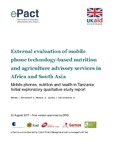| dc.contributor.author | Barnett, Inka | |
| dc.contributor.author | Brockerhoff, Stephanie | |
| dc.contributor.author | Medardi, Deogardius | |
| dc.contributor.author | Gordon, Jess | |
| dc.contributor.author | Srivastava, Shilpi | |
| dc.coverage.spatial | Tanzania | en |
| dc.date.accessioned | 2018-02-22T11:14:26Z | |
| dc.date.available | 2018-02-22T11:14:26Z | |
| dc.date.issued | 2017-08-23 | |
| dc.identifier.citation | Barnett, I.; Brockerhoff, S.; Medardi, D.; Gordon, J. and Srivastava, S. (2017) Mobile phones, nutrition and health in Tanzania: Initial exploratory qualitative study report. External evaluation of mobile phone technology-based nutrition and agriculture advisory services in Africa and South Asia, Brighton: IDS | |
| dc.identifier.uri | https://opendocs.ids.ac.uk/opendocs/handle/20.500.12413/13566 | |
| dc.description.abstract | This report presents the thematic analysis of the findings from the initial qualitative exploratory study carried out between October and November 2016 which is part of the mNutrition evaluation. It took place in six purposefully selected villages in the Iringa region of Tanzania. The first qualitative data collection phase is designed as a rapid qualitative exploratory study, which allows contextual analysis of social, economic and environmental factors that may hinder or facilitate the uptake of the Wazazi Nipendeni plus mNutrition intervention and its effectiveness in promoting behaviour change. The initial exploratory qualitative study focuses on four thematic aims:
1. Access to, use of and attitudes towards mobile phone technology by mothers and pregnant women;
2. Barriers to and facilitators of the uptake of mobile phone-based messages by mothers and pregnant women;
3. Information needs and current information-seeking behaviours related to health and nutrition among pregnant women, breastfeeding mothers and mothers of children below the age of two years; and
4. Social, economic and environmental factors that may influence behaviour change related to the nutrition of infants, young children, pregnant and breastfeeding women.
Gender and poverty are taken as cross-cutting issues to be considered across all four themes. Findings from the initial exploratory study will form an important basis for the more in-depth qualitative midline and the endline qualitative data collection. | en |
| dc.language.iso | en | en |
| dc.rights.uri | http://creativecommons.org/licenses/by-nc-nd/4.0/ | en |
| dc.subject | Gender | en |
| dc.subject | Health | en |
| dc.subject | Nutrition | en |
| dc.subject | Technology | en |
| dc.title | Mobile phones, nutrition and health in Tanzania: Initial exploratory qualitative study report. External evaluation of mobile phone technology-based nutrition and agriculture advisory services in Africa and South Asia | en |
| dc.type | Series paper (non-IDS) | en |
| dc.rights.holder | © Institute of Development Studies 2017 | |
| dc.identifier.team | Health and Nutrition | en |
| rioxxterms.funder | Department for International Development | en |
| rioxxterms.identifier.project | External evaluation of mobile phone technology based nutrition and agriculture advisory services in Africa and South Asia (mNutrition) | en |
| rioxxterms.version | NA | en |
| rioxxterms.funder.project | 417282f8-10a9-42e1-9fb8-98ed18297269 | en |


